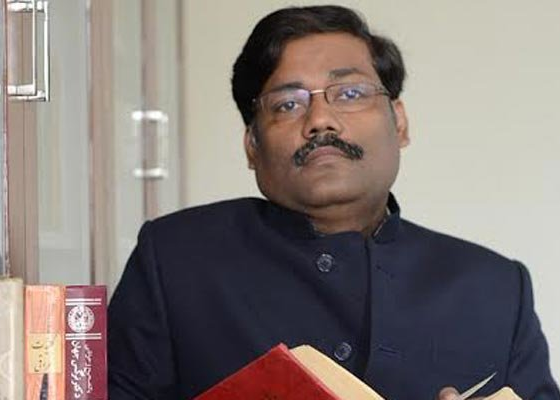
Tehran Book Fair is Effective in Promoting Reading Habit
1403/02/23-13:58
Professor of the Persian Language and Literature Department of Jawaharlal Nehru University said: I have experience attending the Tehran International Book Fair. People were buying and reading books at the exhibition with enthusiasm, which is why I think this exhibition is effective in promoting book reading.
According to the news headquarters of the thirty-fifth international exhibition of books in Tehran, Akhlagh Ahmad Ansari (Ahan), is a Professor of Persian Language and Literature Department of Jawaharlal Nehru University, Researcher of Indian-Farsi Studies and a bilingual Urdu and Persian poet. In his poetry, he has paid more attention to the beautiful format of Ghazal than any other. His scientific work also focuses more on the research of Persian history and culture in India, the studies of Sufism and Mysticism, Amir Khosrowology, Bidlology, Molavi Studies, Khayyam Studies, Cultural Journalism, Understanding modern Persian literature and translation. Akhlagh Ahan has published about thirty book titles, including writing, translation, and editing. In addition to winning numerous national and international awards for his research works, he has also won prestigious awards for his poetry collection in Urdu ـ with the title "Soroor". The news headquarters had an interview with him regarding the Tehran International Book Fair.
Do you have experience in the Tehran Book Fair? If yes, talk to the audience about the features that grabbed your attention.
yes, I have. Almost 9 Years ago, in 2015, while I was two or three months in Iran, I went to the book fair twice. I love books and I crave them. I was at Qazvin International University and from there I came to Tehran twice and visited the book fair. the place was very large. At that time, the exhibition was held at Imam Khomeini Mosalla, which was under construction.
I saw people and audiences who were passionate about books and bought and read books. That's why I found that this exhibition is effective in the promotion of book reading. We know Iranians are readers, they read books and they love doing it. In terms of statistics, we see that Iran is probably the seventh country in the world in terms of publishing books, which is a very valuable and important statistic.
What Indian books would you like most to be presented to the audience at the Tehran Book Fair?
Since I was a student of Persian language and literature, and I also like history and general literature, I would like to publish books on Persian literature and Persian history, as well as Indian history. Persian language, literature and culture has been a very important element of this region. I am more interested in these books, as well as books about philosophy, especially Eastern philosophy, mysticism, and the laws of poetry, as well as contemporary Persian literature and the region. These are subjects that I personally work on and would love to read.
How do you assess the cultural relations between India and Iran?
We know that India and Iran are and have been very close historically, culturally, linguistically and civilizationally. But due to various factors, a distance has also occurred, which dates back to the past centuries. Now we need to re-establish this relationship and read and understand each other's literature, culture and history. For example, in the past two or three centuries, the literature that has been produced and written in Iran is usually not familiar for Indians. Also, during this time, Persian literature and languages that were close to Persian and written in India are not known in Iran and Iranians are not usually familiar with it. With the exception of Iqbal, Tagore and Biddle, most people do not know much about Indian Persian literature in the past two or three centuries. We also do not pay much attention to Indian literature or contemporary Indian languages that have been influenced by Persian language and literature, and we do not do anything comparative to them. It is necessary to pay attention to this issue by the people of literature and researchers from both countries. The first step is to read these works and translate from Persian literature – its stories and poems – into Hindi, as well as contemporary Indian literature into Persian.
What do you think of Iranian publishers interested in Indian culture and history and how do you evaluate their performance?
I have seen Iranian publishers, like the artistic field of the Islamic Propaganda Organization (Mehr Sura), have also published books from India, such as the Biddle Court or the poetry of some contemporary Indian poets. Also, the Academy of Persian Language and Literature has done very valuable work on Indian history and literature in terms of research. In addition, the collection of written heritage, which is more concerned with the correction of manuscripts and old books, has been and is our favorite. books by Indian writers and poets have been published, especially by Amir Khosrow Dehlavi and others. Mola Publication has also published more books on mysticism and Sufism, which people are very interested in here. We are looking forward to use contemporary Persian books that are published by Tahoori and Amir Kabir and other publications, and we would like to have them.
Who is your favorite contemporary Indian writer?
There are two writers in English who happen to be my friends. First Vikram Seth and the other Ms. Arvandati Rai, both world-renowned novelists. These two happen to be of us and are famous characters in other languages of India. I write in four languages and have familiarity with Urdu, Hindi, English and Persian poets, and we use these people and read their works. From other contemporary writers I can mention Kamala Das Surayya, who is an English writer and poet in South India, and I have written about it too. She has also overlooked Islam.



 بازگشت
بازگشت

